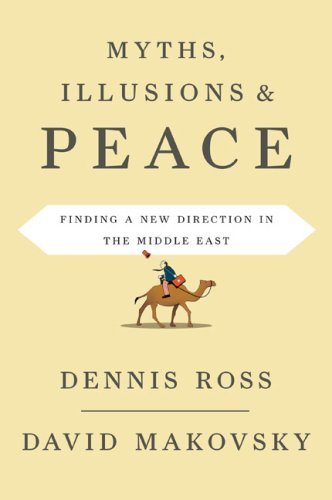Myths, Illusions and Peace by Dennis Ross and David Makovsky
Interview with David Makovsky
September 6, 2009 / Online exclusive / thejewishstar.com
David Makovsky is a fellow at the Washington Institute for Near Eastern Policy and an adjunct lecturer at John Hopkins University. Together with Dennis Ross, who served as the chief negotiator for the Israeli Palestinian conflict under both Presidents George H. W. Bush and Bill Clinton, and who currently serves in the State Department, he authored Myths, Illusions and Peace (Viking). The book aims to correct a number of misconceptions about the Middle East both from the neoconservative perspective and the realist view, as well as offer some novel solutions to the conflict in the region. Makovsky, who is Orthodox and lives in Washington, DC spoke to the Jewish Star about the book.
Jewish Star: What your goal in writing the book?
David Makovsky: We felt that there were certain myths handed down from generation to generation and new myths being accepted without being questioned. We felt that there was a need to assess those assertions and puncture them when it was required and offer constructive ideas [in their place]. It's very easy to be a critic, when you don't have any ideas of you own.
JS: What was the largest myth that you debunked?
DM: We call linkage the mother of all myths. It's been out there for the longest amount of time. The argument is that solving the Arab-Israel issue is a panacea -- you solve this and you solve the conflict of the Middle East. We don't see it connected to the issue and we don't think the resolution is connected. But it fascinated us how it's perpetuated. It's been an effort by the Arab States to get the US to see the conflict through the prism they would like. It's used by the Arabs States to deflect criticism existing in its own states. It's effective in silencing dissidence.
JS: What has perpetuated the myth?
DM: The zenith of the argument was 1973-1974 when the Arab States did act and did put the collective interest instead of their national interests. I think that has scarred many Americans, but they don't ask what happened [after]. Why did the embargo stop? The Arab States’ divisions within the regions were greater than what brought them together. Their regional dynamics the differences were greater than they appeared. It's always alluring for Americans to say if only we did this we could solve all the problems. I think after 9-11 they stopped believing this, the war in Iraq, and Al Qaeda. America had a crash course on the complexities of the Middle East but the Arabs kept on making the argument no matter what.
JS: What about John Mearsheimer and Stephen Walt, authors of “The Israel Lobby”? They seem to be your pet peeve in the book.
DM: That was one of the reasons why we wrote the book. Their [Mearsheimer and Walt] view is Israel is a strategic liability and our view is, if you have a feel for the region it's more complicated than that. Israel is an asset even to Arab governments since they have the same enemies. These Arab governments view Israel as a counterweight to extremism. It doesn't mean they're in love, but in the 2009 war, Egypt, Saudia Arabia and Jordan were rooting for Israel.
Walt and Mearsheimer are quintessential realists. It's a school of thought like a Beit Hillel or Beit Shamai. The whole concept of the realist is that American national interests are driven by some very basic ideas; in the Middle East that's oil, and American policy in the Middle East should reflect that. In that context the realists see Israel as an impediment.
But in America, foreign policy is an amalgam of values and interests. We're saying that [the realist outlook of] interests is incorrect because if you look at the regional bedfellows it's stranger then it appears on the surface. The Saudies don't want the Iranians to have a bomb; the Egyptians don't want Hamas to take over Gaza, and neither want Hezbollah to take over Lebanon. The world is more complicated than bumper stickers.
There's always been this tension in foreign policy between interests or should it be driven by the themes of Judeo-Christian values and a common outlook on the world. I think it's a false argument. American foreign policy will always be guided by both and neither will be sustained if it doesn't have the support of the American people.
JS: On another note, why is former President Jimmy Carter so annoying?
DM: Carter totally misread the map in 1976 and people don't know that. Sadat went to Israel not because of Carter, but despite him. Carter was furious; it was one of the great moments of the 20th century and he thought it undermined his strategy. I think he is still misreading the map.
JS: What is your view of Iran and how has it changed in light of the disputed election?
DM: We felt that in a certain way the Iranians gained from the approach of the Bush administration. It enabled Iran to make America the problem and I think here, the issue is America is willing to try, but we're not going to allow Iran to play out the clock. The US is basically using the engagement approach. Engagement can be a tactic or strategy, if you're serious, it's a strategy, and if you're, not, it's a tactic. Right now given where Iran is, it doesn't seriously want to engage the US and therefore if they don't want to engage so don't be surprised that the US will give them a pathway: you want to walk through this doorway, you don't forget it, you'll be met with sanctions and Israel will attack. We're trying to put the ball in their court.
JS: Do you think Israel will attack?
DM: Should US-Iranian engagment fail and should economics sanctions not prove to be effective, I think the odds of an Israeli strike grow perhaps even by 2010.
Interview conducted, edited and condensed by Michael Orbach

 62.0°,
Overcast
62.0°,
Overcast 







